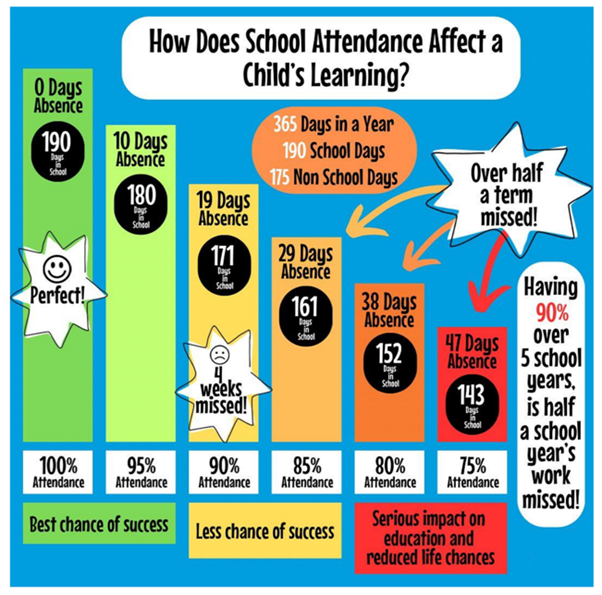Attendance
"My child has always come out of class very happy and loves going into school."
Good attendance at school is vital for children to achieve their full educational potential.
Children with good attendance records benefit in the following ways:-
- Continuity of learning which makes progress and retention easier
- Improved performance in class
- Enhanced performance in examinations

- Continuity of relationships and friendships
- Good references for further education or employment
- Good habits are formed for later life
What constitutes good attendance?
Attendance percentages are not like examination results: an attendance percentage needs to be in the high nineties before it can be considered good.

Our Attendance Policy provides parents with a clear understanding of our stance and procedures. The threshold for concern and action is summarised below:
september 2024 attendance expectations at shirehampton primary school updated january 25.pdf
Being in school and having the best attendance possible underpins all the many benefits of school for your child, such as their learning, wellbeing and wider development. For some children, attending school every day will be harder than for others. This is why as a school we are committed to working together with families to solve problems and support your child’s school attendance.aaa guide for parents on school attendance.pdf
Overview
As a parent you must make sure your child gets a full-time education that meets their needs (for example if they have special educational needs). You can send your child to school or educate them yourself.
Children must get an education between the school term after their 5th birthday and the last Friday in June in the school year they turn 16.
You’ll be contacted by either:
- the school - if your child is enrolled in school and does not turn up (even if they’re only absent for a day)
- the council’s education welfare officer - if they think your child is not getting a suitable education at home
You can be prosecuted if you do not give your child an education. You’ll normally get warnings and offers of help from the local council first.
You can get education and attendance information from your council.
school attendance leaflet 2020.pdf
When your child can miss school
You can only allow your child to miss school if either:
- they’re too ill to go in
- you’ve got advance permission from the school
There’s extra support available if your child cannot go to school for long periods because of a health problem.
shoud i keep my child off school checklist poster.pdf
Free NHS app helps parents care for their poorly child: With common childhood illnesses become more frequent, a free NHS app can help parents decide how best to care for their child. The HANDi app (developed by specialist children’s doctors) is quick and easy to use giving expert advice on a range of childhood illnesses, including diarrhoea/vomiting, high temperature, tummy pain, chestiness, head injuries and common problems experienced by newborn babies. The app takes parents through a series of questions about their child’s symptoms and then advises on the best course of action, whether that’s to treat at home, to make a GP appointment, call NHS 111 or call 999. The HANDi App is available to download for Apple phones from the app store or iTunes and for Android phones at Google Play. Alternatively, please use the QR code: 
Holidays in term time
You have to get permission from the head teacher if you want to take your child out of school during term time.
You can only do this if:
- you make an application to the head teacher at least 2 weeks in advance (as a parent the child normally lives with)- please collect a form the school office.
- there are exceptional circumstances
It’s up to the head teacher how many days your child can be away from school if leave is granted.
You will be fined for taking your child on holiday during term time without the school’s permission.
School trips
Your child’s school can ask you for a voluntary contribution to the cost of activities like school trips. They cannot stop your child from attending if you do not pay, but they should cancel the activity if there is not enough money to cover the cost of it.
Help with getting your child to go to school
If you’re having trouble getting your child to go to school, the school and local council can help.
The school will discuss attendance problems with you and should agree a plan with you to improve your child’s attendance.
A lot of local councils have teams that help parents improve their child’s attendance at school. The council will tell you if they’re able to help. Forms of help could include:
- support to reduce the burden on children where families are in difficulty (for example if a child is spending a lot of time caring for someone)
- working with families and schools to overcome bullying and other serious problems
- a parenting contract
Attendance contract
This is a voluntary written agreement between you and either the local council or the school’s governing body. Between you, you agree to find ways to improve your child’s attendance.
If you refuse to make a contract or you do not stick to it, it can be used as evidence if the local council decides to prosecute you.
Legal action to enforce school attendance
Local councils and schools can use various legal powers if your child is missing school without a good reason. They can give you:
- a Parenting Order
- an Education Supervision Order
- a School Attendance Order
- a fine (sometimes known as a ‘penalty notice’)
You can be given one or more of these but the council does not have to do this before prosecuting you.
Parenting Order
This means you have to go to parenting classes. You’ll also have to do what the court says to improve your child’s school attendance.
Education Supervision Order
If the council thinks you need support getting your child to go to school but you’re not co-operating, they can apply to a court for an Education Supervision Order.
A supervisor will be appointed to help you get your child into education. The local council can do this instead of prosecuting you, or as well.
School Attendance Order
You’ll get a School Attendance Order if the local council thinks your child is not getting an education.
You have 15 days to provide evidence that you’ve registered your child with the school listed in the order or that you’re giving them home education. If you do not, you could be prosecuted or given a fine.
Fine
Your local council can give each parent a fine of £60, which rises to £120 each if you do not pay within 21 days. If you do not pay the fine after 28 days you may be prosecuted for your child’s absence from school.
You could get a fine of up to £2,500, a community order or a jail sentence up to 3 months. The court also gives you a Parenting Order.

 Shirehampton
Shirehampton